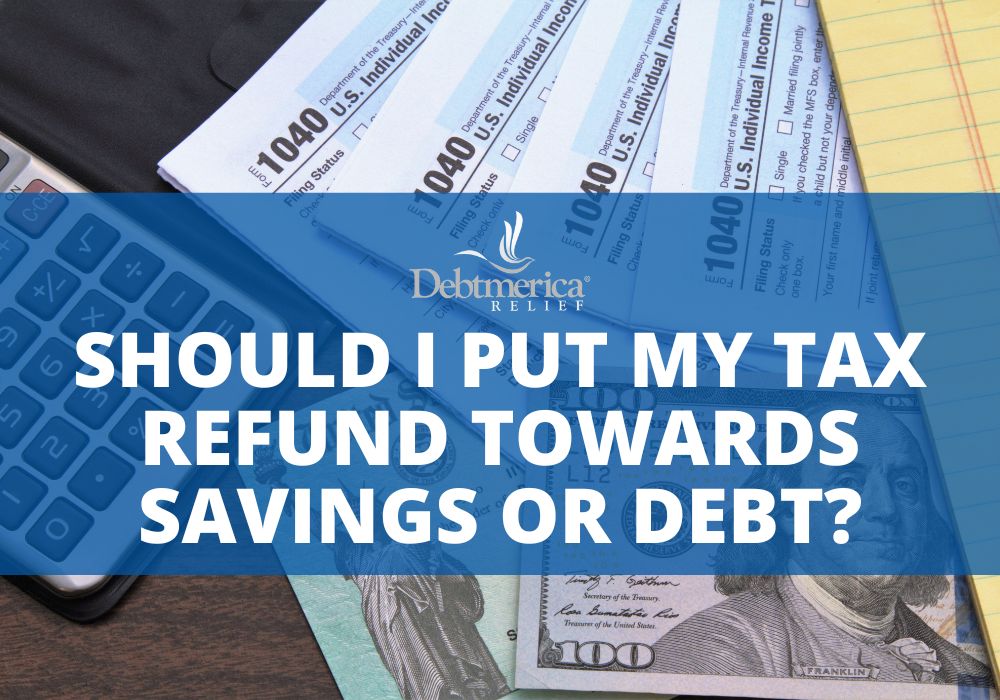Should I Put My Tax Refund Towards Savings or Debt?

As tax season ends, many individuals find themselves with a welcome financial windfall in the form of a tax refund. Whether it’s a modest sum or a substantial amount, the question arises: what’s the best use for this money? Should you channel it into your savings or use it to pay off existing debts? Let’s explore the considerations to help you make the most informed decision.
The Case for Savings
Emergency Fund Reinforcement
A robust emergency fund is the cornerstone of financial stability. Putting your tax refund into savings can beef up this fund, providing a safety net for unexpected expenses like medical bills, car repairs, or sudden job loss. Financial experts often recommend having three to six months’ worth of living expenses saved up for emergencies.
Opportunity Fund
Your tax refund can serve as seed money for future opportunities. Whether it’s investing in stocks, starting a small business, or pursuing further education, having a pool of savings can empower you to seize these chances without resorting to high-interest loans or credit cards.
Long-Term Goals
Saving your tax refund can contribute to achieving long-term financial goals such as buying a home, funding your children’s education, or enjoying a comfortable retirement. Putting this money into retirement accounts like an IRA or 401(k) can help it grow over time through compound interest, setting you up for a more financially secure future.
The Case for Debt Repayment
Interest Savings
Paying off high-interest debt, such as credit card balances or personal loans, can save you money in the long run. By eliminating or reducing these debts, you’ll not only free up more of your income for other purposes but also avoid paying hefty interest charges over time.
Psychological Relief
Carrying debt can weigh heavily on your mind and cause stress. Using your tax refund to pay off debt, especially smaller balances or high-interest loans, can provide a sense of relief and reduce financial anxiety. It’s a step towards financial freedom and peace of mind.
Improved Credit Score
Lowering your debt-to-income ratio by paying off outstanding debts can positively impact your credit score. A higher credit score can lead to better loan terms and interest rates in the future, saving you even more money when borrowing for significant purchases like a home or car.
Finding the Balance
Ultimately, the decision to save or pay off debt with your tax refund depends on your individual financial situation and goals. Consider the following tips to strike a balance:
Assess Your Priorities
Evaluate your short-term and long-term financial objectives. Are you focused on building an emergency fund, saving for a specific goal, or reducing debt? Align your use of the tax refund with your priorities.
Prioritize High-Interest Debt
If you have multiple debts, prioritize paying off those with the highest interest rates first. This strategy minimizes the overall interest you’ll pay over time, accelerating your journey towards debt freedom.
Create a Plan
Develop a comprehensive financial plan that integrates saving and debt repayment goals. Allocate a portion of your tax refund to each objective according to your plan, ensuring progress towards both financial stability and debt reduction.
Seek Professional Advice
If you’re unsure about the best course of action for your financial situation, consider consulting with a financial advisor. They can provide personalized guidance tailored to your circumstances and help you make informed decisions.
Conclusion
Whether to put your tax refund towards savings or debt repayment is a significant financial decision with implications for your future financial well-being. By weighing the benefits of each approach and considering your individual priorities, you can make a choice that aligns with your goals and sets you on a path towards financial success. Remember, it’s not just about maximizing your refund—it’s about maximizing its impact on your financial future.
Debtmerica Relief has over 17 years of experience in providing relief to our clients whose financial burdens have become too much to handle.
If you need help with debt, contact us for a free consultation.



